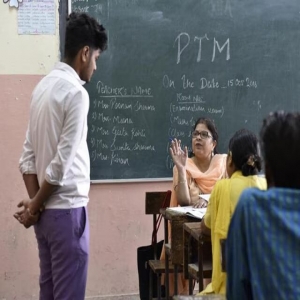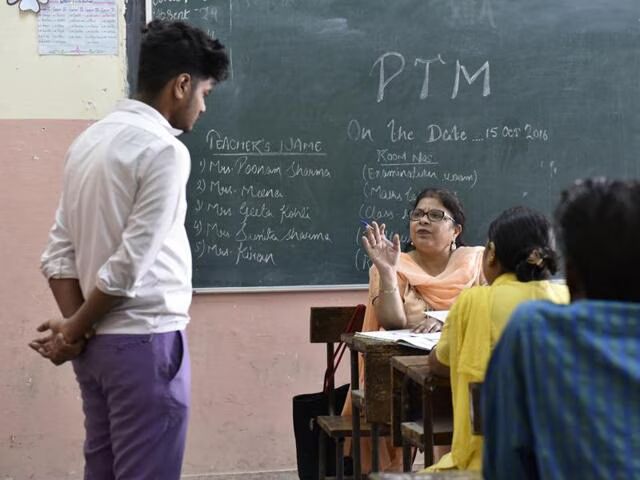

My hands, once filled with the hopeful weight of shaping young minds, now tremble with the despair of a profession betrayed. I am a teacher, and I watch the slow, agonising decline of my calling, a silent crisis unfolding in the classrooms of India.
It's not just a worry; it's a chilling, pragmatic fear for the future. We are raising a generation of beautifully decorated, hollow structures—wax statues—destined to melt under the gentlest rays of reality. We are creating qualified doctors who cannot heal, engineers who cannot build, lawyers who cannot plead, and worst of all, teachers who cannot teach.
My colleagues and I are being forced to produce high marks, not educated human beings; this is an insidious lie we perpetuate, ultimately leading to the ruin of our students. Look around—do you see the rising instances of student suicides? That is the sound of our failure, a desperate cry we are trained to ignore.
The dignity of teaching is gone. Students are no longer aspiring learners; they are customers. And the cardinal rule of business is to keep the customer happy, even if it means sacrificing truth. We are told to be "facilitators," yet the system—the parents, the boards, the absurd theories—binds our hands. We are forced to mould, not to mentor. We are told not to punish, not to challenge, not to even stare at a child, lest we inflict "mental torture." Yet, what greater torture is there than equipping a child with a meaningless grade and sending them out to face 100% failure in the real world?
I am a scapegoat. When a student excels, the credit belongs to the child's "intelligence and hard work," and the "thoughtful parents." But if a child fails, I, the subject teacher, am instantly the centre of the circle of accusation. I am the incompetent one, facing termination because an irresponsible student didn't get the marks their paying parents demanded.
You wouldn't dare instruct a surgeon on how to operate, or an engineer on how to mix concrete. But in a classroom? Everyone is an expert. Every parent and every bystander feels entitled to lecture us on how their "tots" should be taught. Our specialised knowledge and decades of experience mean less than a single, irate phone call from a parent.
We stand on a non-existent foundation. We, the Class X/XII teachers, are tasked with constructing the tenth/twelfth floors of a building when the fifth, sixth, seventh, eighth, and ninth floors are missing. We are compelled to pass students—the apathetic, the uninterested, the ill-equipped—due to grade systems and parental pressure. We watch as our efforts are deliberately sabotaged by students who know that their own failures will ultimately be blamed on us.
Who is at a loss in this mad race for passing percentages? It is the nation that loses the farmer, the mechanic, the carpenter—the necessary components of a balanced society—because we push everyone toward a professional degree they are unfit for. It is the young adult who faces the ignominy of ultimate failure after spending lakhs of hard-earned money.
The parents, who created this monster, remain passive onlookers, allowing corporate management to dismiss the finest teachers at the behest of a few who are lazy.
My God, when will they realise that the success of a nation is not measured by the percentage of students who pass an exam, but by the scope and depth of their contribution to society?
I am weary. I am defeated. I fear that by the time we enact the necessary Child Responsibility Act—the common-sense measure that requires effort for reward—it will be too late. My professional life is a struggle against the tide, an agonising, ungrateful battle I am losing every single day. And the sound of that loss is the future of India, crying out in the wilderness of its own ignorance.
The air is heavy with the ghost of respect. Just a couple of decades ago, being a teacher was to be the backbone of the nation, a figure of unquestioned authority whose word was law in the realms of knowledge and morality. We were entrusted with a sacred duty: to mould the nation's future, one mind at a time.
Now, that respect is a brittle memory. I stand here, stripped down to a transactional label: "instructor." I am told my only duty is to teach, but oh, the cruel irony! How can I teach when the foundation is shattered?
The very possibility of my calling hinges on a single, fragile premise: a student willing to learn. But when the student remains utterly alien to the process of learning, when their attention is a fortress I cannot breach, when their hearts and minds are elsewhere... how, then, can the act of teaching even begin?
I am a vessel of wisdom, but the connection is severed. I have the map to the future, but the traveller refuses to walk. I am supposed to shape a generation, yet I am powerless to even engage a single mind.
The aura of dignity is a thing of the past. The authority is gone. All that remains is the agonising despair of holding a sacred key to a door that society has slammed shut, leaving me to merely echo lessons into an empty, uncaring void. I am a teacher who is forbidden to teach. That is the most profound betrayal.
Even as these hard truths spill onto the page, they are nothing less than a prayer, desperately clinging to the hope of a brighter dawn. This harsh critique is a plea, born not of malice, but of a broken heart yearning for what we once were and what we still might be.
If my words have wounded anyone—if the mirror I held up caused pain—please know the offence was never my intent. It is with profound sadness that I offer this reflection, and I deeply regret the inconvenience caused to anyone who struggles to believe in a future that I fear we are losing.